
An astronomer is a scientist in the field of astronomy who focuses on a specific question or field outside the scope of Earth. Astronomers observe astronomical objects, such as stars, planets, moons, comets and galaxies – in either observational or theoretical astronomy. Examples of topics or fields astronomers study include planetary science, solar astronomy, the origin or evolution of stars, or the formation of galaxies. A related but distinct subject is physical cosmology, which studies the Universe as a whole.

Amateur astronomy is a hobby where participants enjoy observing or imaging celestial objects in the sky using the unaided eye, binoculars, or telescopes. Even though scientific research may not be their primary goal, some amateur astronomers make contributions in doing citizen science, such as by monitoring variable stars, double stars, sunspots, or occultations of stars by the Moon or asteroids, or by discovering transient astronomical events, such as comets, galactic novae or supernovae in other galaxies.
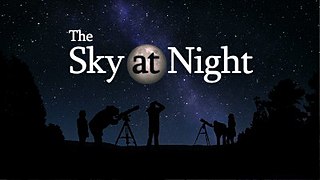
The Sky at Night is a documentary television programme on astronomy produced by the BBC. The show had the same permanent presenter, Sir Patrick Moore, from its first monthly broadcast on 24 April 1957 until 7 January 2013. The latter date was a posthumous broadcast, following Moore's death on 9 December 2012. This made it the longest-running programme with the same presenter in television history. Many early episodes are missing, either because the tapes were wiped or thrown out, or because the episode was broadcast live and never recorded in the first place.

Sir Patrick Alfred Caldwell-Moore was an English amateur astronomer who attained prominence in that field as a writer, researcher, radio commentator and television presenter.
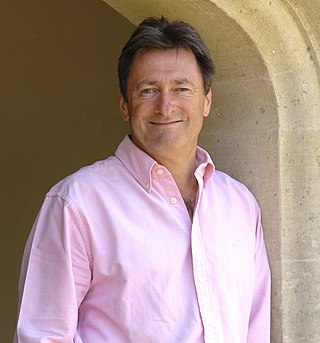
Alan Fred Titchmarsh HonFSE is an English gardener and broadcaster. After working as a professional gardener and a gardening journalist, he became a writer, and a radio and television presenter.

John Lowry Dobson was an American amateur astronomer and is best known for the Dobsonian telescope, a portable, low-cost Newtonian reflector telescope. He was also known for his efforts to promote awareness of astronomy through public lectures including his performances of "sidewalk astronomy". Dobson was also the co-founder of the amateur astronomical group, the San Francisco Sidewalk Astronomers.

Heather Anita Couper, was a British astronomer, broadcaster and science populariser.
Terence Dickinson was a Canadian amateur astronomer and astrophotographer who lived near Yarker, Ontario, Canada. He was the author of 14 astronomy books for both adults and children. He was the founder and former editor of SkyNews magazine. Dickinson had been an astronomy commentator for Discovery Channel Canada and taught at St. Lawrence College. He made appearances at such places as the Ontario Science Centre. In 1994, the International Astronomical Union committee on Minor Planet Nomenclature named asteroid 5272 Dickinson in honour of his "ability to explain the universe in everyday language".
Anton Vamplew, is an English amateur astronomer, author, lecturer and media presenter of the subject.

Stuart Nigel Henbest is a British astronomer and science communicator. Born in Manchester and educated in Belfast and at Leicester University, Henbest researched in radio astronomy at the University of Cambridge before becoming a freelance author, television producer and astronomy lecturer. Asteroid 3795 Nigel is named after him.

Kielder Observatory is an astronomical observatory located in Kielder Forest, Northumberland, England. The site is on Black Fell, overlooking Kielder Water near the Scottish border. It is accessible from James Turrell's Kielder Skyspace via a half-mile long forest track.
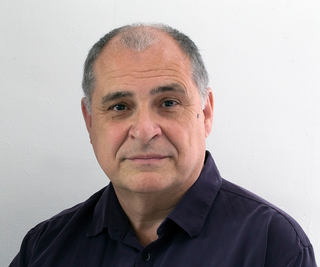
Peter B. Lawrence is a British amateur astronomer. Since 2004, he has been a presenter on the BBC's The Sky at Night. He makes high resolution images of the Sun, Moon and planets, and takes images of time-limited phenomena such as eclipses and the aurora.
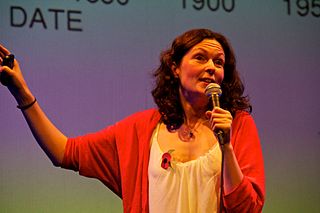
Lucinda "Lucie" May Green is a British science communicator and solar physicist.
Stargazing Live is a British live television programme on astronomy that was broadcast yearly on BBC Two over three nights every winter from 2011 to 2017. The series was primarily presented by scientist Brian Cox and comedian and amateur astronomer Dara Ó Briain with support from TV presenter and biochemist Liz Bonnin and astronomer Mark Thompson. For the first six series, the show was broadcast from Jodrell Bank Observatory in Cheshire, and featured live links from scientific facilities in locations such as Hawaii, South Africa, and Norway. The seventh series in 2017 was broadcast from Siding Spring Observatory in Australia, and a special episode filmed at Kennedy Space Center was broadcast in July 2019 to celebrate the 50th anniversary of the Apollo 11 mission.

Macarthur Astronomy Forum is a monthly public forum organised by Macarthur Astronomical Society, providing leading national and international professional astronomers with a platform to address the Forum on topics of astronomical interest; also providing members of the Society and the general public with opportunities to learn and ask questions.

The Astronomical Society of Glasgow (ASG) was founded in 1954 in Glasgow, Scotland, by amateur astronomers and is dedicated to promoting an interest in Astronomy.
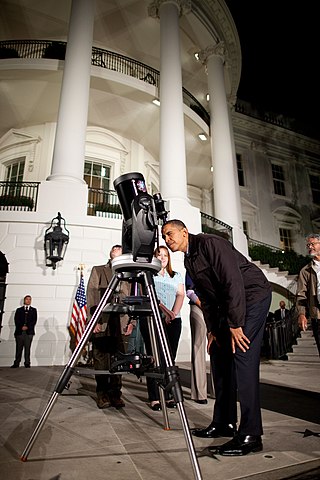
White House Astronomy Night is an event first organized by the White House in conjunction with the Office of Science and Technology Policy to motivate interest in astronomy and science education. The original White House Astronomy Night was held in 2009 on the South Lawn. In 2010 the White House and the Office of Science and Technology Policy organized a similar event with help from Hofstra University, this time held on the National Mall. Between 2010 and 2014 annual events took place at the National Mall with coordination between Hofstra University and federal agencies including: the Smithsonian National Air and Space Museum, NASA, and the National Science Foundation. In 2015 an event took place in June at the National Mall, and then back at the White House again on October 19.

The Jodcast is a monthly podcast created by astronomers at Jodrell Bank Centre for Astrophysics (JBCA), University of Manchester in Manchester, England. It debuted in January 2006, aiming to inspire and inform the public about astronomy and related sciences, to excite young people with the latest astronomy research results, to motivate students to pursue careers in science, and to dispel stereotypes of scientists as incomprehensible and unapproachable.
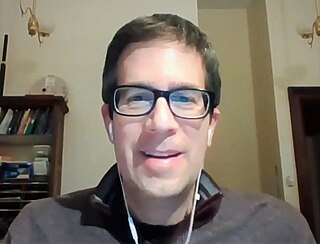
Dean Regas is an American astronomer, public speaker, author, and television host. He is most widely known as the cohost of the syndicated television show Star Gazers, which airs daily on more than 100 PBS stations around the world. He was the Outreach Astronomer for the Cincinnati Observatory from 2000 to 2023 where he specialized in astronomy education and public speaking. Regas is the author of three books Facts From Space!, 100 Things to See in the Night Sky, and 100 Things to See in the Southern Night Sky.
















